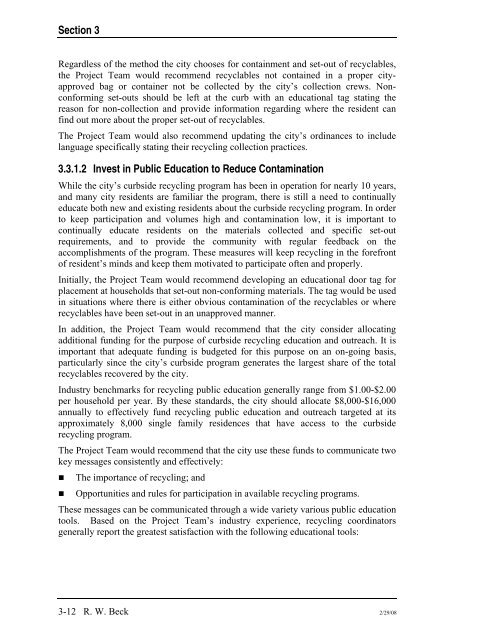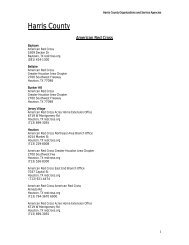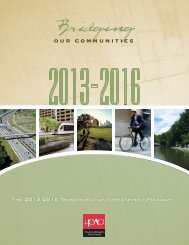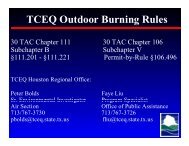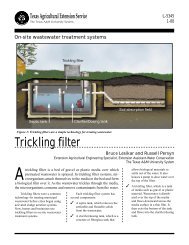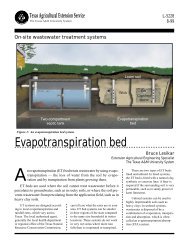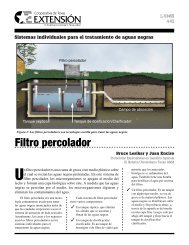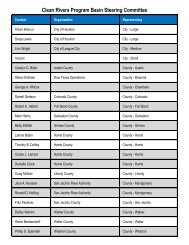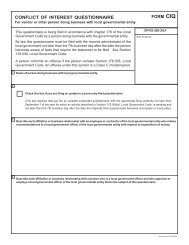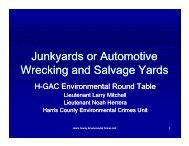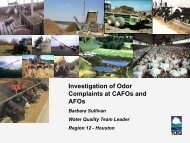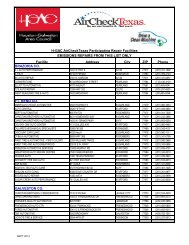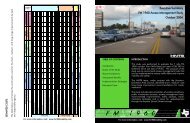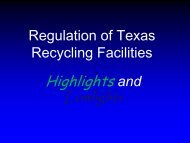Recycling and Waste Minimization Case Studies - Houston ...
Recycling and Waste Minimization Case Studies - Houston ...
Recycling and Waste Minimization Case Studies - Houston ...
You also want an ePaper? Increase the reach of your titles
YUMPU automatically turns print PDFs into web optimized ePapers that Google loves.
Section 3<br />
Regardless of the method the city chooses for containment <strong>and</strong> set-out of recyclables,<br />
the Project Team would recommend recyclables not contained in a proper cityapproved<br />
bag or container not be collected by the city’s collection crews. Nonconforming<br />
set-outs should be left at the curb with an educational tag stating the<br />
reason for non-collection <strong>and</strong> provide information regarding where the resident can<br />
find out more about the proper set-out of recyclables.<br />
The Project Team would also recommend updating the city’s ordinances to include<br />
language specifically stating their recycling collection practices.<br />
3.3.1.2 Invest in Public Education to Reduce Contamination<br />
While the city’s curbside recycling program has been in operation for nearly 10 years,<br />
<strong>and</strong> many city residents are familiar the program, there is still a need to continually<br />
educate both new <strong>and</strong> existing residents about the curbside recycling program. In order<br />
to keep participation <strong>and</strong> volumes high <strong>and</strong> contamination low, it is important to<br />
continually educate residents on the materials collected <strong>and</strong> specific set-out<br />
requirements, <strong>and</strong> to provide the community with regular feedback on the<br />
accomplishments of the program. These measures will keep recycling in the forefront<br />
of resident’s minds <strong>and</strong> keep them motivated to participate often <strong>and</strong> properly.<br />
Initially, the Project Team would recommend developing an educational door tag for<br />
placement at households that set-out non-conforming materials. The tag would be used<br />
in situations where there is either obvious contamination of the recyclables or where<br />
recyclables have been set-out in an unapproved manner.<br />
In addition, the Project Team would recommend that the city consider allocating<br />
additional funding for the purpose of curbside recycling education <strong>and</strong> outreach. It is<br />
important that adequate funding is budgeted for this purpose on an on-going basis,<br />
particularly since the city’s curbside program generates the largest share of the total<br />
recyclables recovered by the city.<br />
Industry benchmarks for recycling public education generally range from $1.00-$2.00<br />
per household per year. By these st<strong>and</strong>ards, the city should allocate $8,000-$16,000<br />
annually to effectively fund recycling public education <strong>and</strong> outreach targeted at its<br />
approximately 8,000 single family residences that have access to the curbside<br />
recycling program.<br />
The Project Team would recommend that the city use these funds to communicate two<br />
key messages consistently <strong>and</strong> effectively:<br />
• The importance of recycling; <strong>and</strong><br />
• Opportunities <strong>and</strong> rules for participation in available recycling programs.<br />
These messages can be communicated through a wide variety various public education<br />
tools. Based on the Project Team’s industry experience, recycling coordinators<br />
generally report the greatest satisfaction with the following educational tools:<br />
3-12 R. W. Beck 2/29/08


